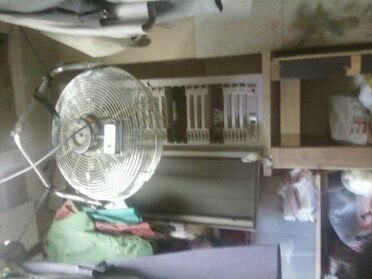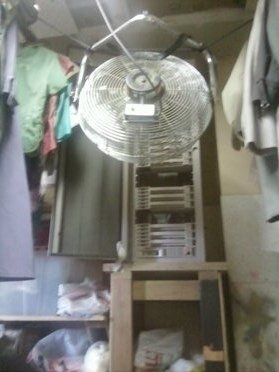Warning: You're going to be very confused when trying to understand exactly what my problem is because I have NO idea what kind of equipment we have.
Ok, here goes.
For the past three years in my experience with the system, we've never had this problem. For the past 10 years of our TD's experience with the system, he's never come across this problem. However, when on my first show as SM, the lights have been doing this funky thing where they just go on and off. The lights turn off then turn back up. We're pretty sure it's something with the dimmers, because they often overheat if there's no fan circulating air in the room that they're in. However, we've never had such a severe problem with it, because now we need one fan pointed directly into the dimmers, and a fan in the room, and both doors open. (Description of the room: a school bathroom turned into storage of costumes. Narrow entrance, but the fan sits at the entrance pointing the inside, and to my knowlege the number of costumes hasn't changed). Another small problem we had was that the board and the lighting system would shut down completely, and then restart itself. That problem stopped when we took the board out and plugged everything back in. However, it's now become a regular ordeal at every performance for the lights to have their dim attack.
^see, confusing.
Random things I think will help you understand:
-our lights are AINCIENT. we have pretty much the oldest ellipsoidals and fresnels that anyone could ever have. When dinosaurs were done with their productions, they gave their equipment to us. Some of them are dusty, but we've cleaned most of them.
-Our "theatre" is a black box theatre. It seats 70, and if we add in extra chairs it seats 100 (ps. we rarely fill it up....)
-our board is on the same level of the lights. OH and we don't have a catwalk. We can pretty much just get a regular ladder and focus lights like that. I'd say it's 10ISH feet off the ground.
OH SPEAKING OF THE LIGHTBOARD, it smells like fire all the time
^ok I realize that's not a good thing. It's only sometimes when we have all the lights on and we're testing them, we just get a burn smell. it goes away...eventually.
So, MY QUESTION IS:
In your experience, with crappy equipment and abuse of the equipment, what are some overall factors that could be contributing to this problem?
My number one theory is that either I'm cursed, or the theatre hates us because we have no talent, acting wise
*my technical director, to my immediate knowledge, did not get a degree in anything, all he has is many years of experience.
Ok, here goes.
For the past three years in my experience with the system, we've never had this problem. For the past 10 years of our TD's experience with the system, he's never come across this problem. However, when on my first show as SM, the lights have been doing this funky thing where they just go on and off. The lights turn off then turn back up. We're pretty sure it's something with the dimmers, because they often overheat if there's no fan circulating air in the room that they're in. However, we've never had such a severe problem with it, because now we need one fan pointed directly into the dimmers, and a fan in the room, and both doors open. (Description of the room: a school bathroom turned into storage of costumes. Narrow entrance, but the fan sits at the entrance pointing the inside, and to my knowlege the number of costumes hasn't changed). Another small problem we had was that the board and the lighting system would shut down completely, and then restart itself. That problem stopped when we took the board out and plugged everything back in. However, it's now become a regular ordeal at every performance for the lights to have their dim attack.
^see, confusing.
Random things I think will help you understand:
-our lights are AINCIENT. we have pretty much the oldest ellipsoidals and fresnels that anyone could ever have. When dinosaurs were done with their productions, they gave their equipment to us. Some of them are dusty, but we've cleaned most of them.
-Our "theatre" is a black box theatre. It seats 70, and if we add in extra chairs it seats 100 (ps. we rarely fill it up....)
-our board is on the same level of the lights. OH and we don't have a catwalk. We can pretty much just get a regular ladder and focus lights like that. I'd say it's 10ISH feet off the ground.
OH SPEAKING OF THE LIGHTBOARD, it smells like fire all the time
^ok I realize that's not a good thing. It's only sometimes when we have all the lights on and we're testing them, we just get a burn smell. it goes away...eventually.
So, MY QUESTION IS:
In your experience, with crappy equipment and abuse of the equipment, what are some overall factors that could be contributing to this problem?
My number one theory is that either I'm cursed, or the theatre hates us because we have no talent, acting wise
*my technical director, to my immediate knowledge, did not get a degree in anything, all he has is many years of experience.




